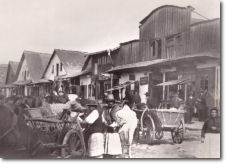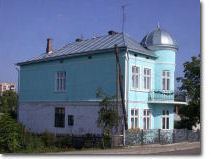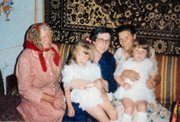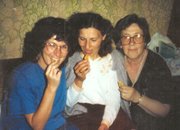The Spitzer Story
One of the survivors from Tluste was Ulka Spitzer (Sommer),
daughter of a prominent businessman in town. Her story is
that of a life-long bond with the person who helped her escape
the fate that befell so many of her fellow citizens of Tluste.
|
The extended Spitzer family were longtime residents
of Tluste, where Hirsch Spitzer was a dealer in building
materials.
Their shop, seen in the photograph opposite, was located
on the main street— a few metres north of the
Roman Catholic church.
|
 |
The Spitzers' prosperous life was abruptly shattered with
the repressive German occupation of Tluste that began around
July 1941. Soon afterwards, anti-Jewish edicts were issued
and periodic Gestapo raids were launched from the Nazi base
in Czortkow, about 20 km to the north. Apart from the two
major raids or Aktionen that took place in August
and October 1942, there were many smaller incursions, characterised
by house searches, arrests, beatings, murders, and confiscation
of property.
The Gestapo came to Tluste two or three times a month to
conduct their evil deeds. In what must have seemed like a
surreal existence, people could move about freely doing their
normal business when the Nazis were not around, but they knew
that sooner or later something was going to happen. The raids
had the effect of creating fear among the Jewish population,
and prompted many to devise elaborate methods of concealment.
Notwithstanding Hirsch Spitzer's good standing in town and
the close proximity of the Spitzer household to the Judenrat
— whose headquarters were located just a couple hundred
meters down the road — the family was as much at risk
as any other. Indeed, in the book, “Can Heaven be Void”,
Baruch Milch
reported that one of the Spitzer boys (it is not known from
which family) was murdered by the Gestapo in 1941.
 |
|
Hirsch Spitzer and his family lived in a
large Baroque-style house on what is today Ukrainska Str.,
a side street to the west of the main north-south road.
The Spitzers employed a Ukrainian nanny by the name of
Natalia Obodiak to look after their children. Born around
1920, Natalia grew up with one of the daughters, Ulka,
who was a few years younger. |
Natalia took care of other Jewish families as well, but she
was especially remembered for having protected the Spitzers
from danger. The following account, told by Evgenia Demkiv,
a contemporary of Natalia, describes how Natalia's actions
facilitated the Spitzer family's escape from Tluste and how,
decades later, she came to be reunited with the woman she
had saved.
Natalia lived just around the corner from the Spitzers, on
Shevchenka Street. Somehow she came to know when Aktionen
were rumoured to happen, and a plan was devised whereby Natalia
was to knock on the window of the Spitzer house three times
to give them advance warning.
The family had to hide in an underground bunker or tunnel
to avoid detection on many occasions. Natalia assisted by
locking them inside. Apparently on the last occasion, in 1943,
Natalia was returning home from having delivered the warning
when she met a policeman in the street. The policeman questioned
her and Natalia implored him not to divulge the family's whereabouts.
In fact, she managed to convince him to help the family hide
even more securely.
Evidently the family was later able to flee to Poland and
escaped the fate of so many other victims in the Aktion
of May 1943.
According to Evgenia, Ulka had overheard what was going on
that fateful day and realised the risk that Natalia had taken
to protect her family. Ulka Sommer, as she would later become,
would have fled to Poland at around 19 years of age. Decades
later, from her eventual home in America,Ulka longed to be
reunited with Natalia. She sent letters, but Natalia didn't
receive them because there were people in the town who didn't
want her to have them.
Undeterred, Ulka arranged for some people to visit Tovste
and they even took a picture of Natalia Obodiak; but Ulka
didn't recognize her in the photo because she had aged so
much. Finally, Ulka Sommer came to Tovste herself in the late
1980s, accompanied by one of her daughters.
| They had a tearful reunion in Natalia's modest home.
In the photograph, opposite, Natalia is seated on the
left, and Ulka is in the middle, holding a child. On that
occasion, it is said that Ulka went inside the old Spitzer
house, presently occupied by the Melnyk family, and she
kissed the floor on the spot where the date of construction
is inscribed. |
 |
| Ulka, accompanied by her daughter (far left), took Natalia
and Ohla Melnyk (center) to a flat in Ternopil where this
photo was taken and a video recording made. |
 |
Ulka Sommer invited Natalia to Israel to be honoured among
the ranks of those who had helped Jews in wartime, but she
was too old to travel. Considering her a member of the family,
Ulka also proposed that she go to the United States, but Natalia
had to decline that also because of her infirmity.
Nevertheless they continued to correspond by mail, in Polish,
with the help of Natalia's friend Evgenia who lived across
the street. Natalia was a spinster and had no telephone, but
her brother did. One day, around 1991, Ulka tried to reach
Natalia by phone but she was unsuccessful. So she tried again
the following day. When Ulka finally made contact with the
brother, she learned that Natalia had passed away the previous
day. Apparently, Ulka sensed that something was amiss with
the woman with whom she had established a life-long bond a
half century earlier.
October 2006 update: Thanks to
this website and a kindred spirit acting as an intermediary,
I am in touch with the Sommer family in the United States,
and I look forward to filling in some of the gaps in this
wonderful story.

|

